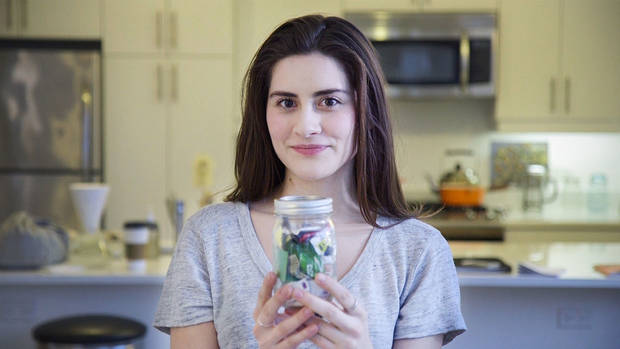Trying to solve everything before doing anything leads to nothing done
The principle that trying to solve everything before doing anything leads to getting nothing done, applies broadly. It came up recently in reducing pollution, so I’ll illustrate it there.
A friend said he wants to go to a zero waste lifestyle and asked me what I do about toothpaste.
Now there are households out there that throw out less than a pound of garbage per year. Most Americans produce more per day. I imagine he throws out less than the average American, but I hope my readers don’t consider Americans useful comparisons for waste—nearly the lowest bar of all populations.

Lauren Singer fits years of garbage into the jar she’s holding. She developed that skill through practice.
It’s easier to talk, analyze, plan, debate, and philosophize than act so most people find ways to avoid acting. Latching onto some side issue and analyzing, talking, debating, etc about it works for most. It did for me for six months before I started avoiding packaged food.
All that planning felt like progress even though I wasn’t doing anything that made a difference.
In my friend’s case, a toothpaste tube is not the only thing he can work on. He’ll have to figure out how to avoid causing that waste to reach zero, but he’ll take longer if it keeps him from what he can do now. Doing what you can now will develop the skills, experiences, and beliefs to solve what you can’t yet.
Solving what they could when they could is how every expert became an expert. Inaction keeps everyone else from growth.
My response to my friend:
Trying to solve everything before doing anything leads to getting nothing done.
If solving toothpaste isn’t obvious, work on what you can do now.
Even if other things seem small—avoiding what food packaging you can, driving less, turning off the water while brushing or shaving, etc—you develop skills, beliefs, and experiences that enable big changes that now seem beyond your abilities.
It’s like lifting weights or starting companies.
Lifting weights that are heavy for you, no matter how light for an experienced weightlifter, enables you to lift heavier weights later. Starting a small venture, even on the scale of a lemonade stand, enables you to start bigger ventures later.
Not only does starting small works, everyone who got big started that way too.
Practicing it with reducing waste is an effective place to start, but you can do it anywhere.
Read my weekly newsletter

On initiative, leadership, the environment, and burpees
Pingback: Avoiding food packaging » Joshua Spodek